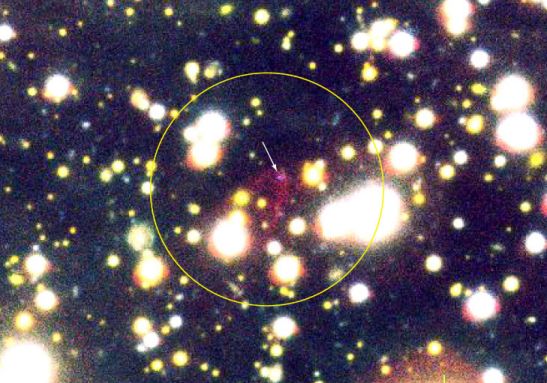
|
Credit & Copyright: M. van Kerkwijk
(Institute of Astronomy, Utrecht),
S. Kulkarni (Caltech),
VLT Kueyen, ESO
Explanation:
The
lonely RX J1856.5-3754 was formed
from the collapsed core of an exploding star.
At a distance of 180 light-years it is the
closest known
neutron star.
More massive than the Sun but only
20 kilometers across, this tiny stellar juggernaut plows
through the hydrogen gas and dust clouds of interstellar
space at about 200 kilometers per second.
The surface of the
neutron star
is fantastically hot, around 700,000 degrees Celsius, making it
detectable with
orbiting x-ray telescopes.
But optical astronomers were
recently surprised to discover that RX J1856.5-3754 is also surrounded
by a cone-shaped nebula.
Indicated in this deep image from the European Southern Observatory's
Kueyen telescope, the nebula glows
in the red light of ionized hydrogen atoms
recombining with electrons.
Its cone shape is analogous to the
bow wave of a ship plowing through water.
A faint blue dot near the tip of the cone
is the neutron star itself.
The nebula appears to have formed very near
the
surface of the
neutron star and astronomers are trying to determine if the
observed densities and temperatures can indeed explain the
nebula's appearance.
|
January February March April May June July August September October November December |
| |||||||||||||||||||||||||||||||||||||||||||||||||||||||
NASA Web Site Statements, Warnings, and Disclaimers
NASA Official: Jay Norris. Specific rights apply.
A service of: LHEA at NASA / GSFC
& Michigan Tech. U.
Based on Astronomy Picture
Of the Day
Publications with keywords: nebula - bow shock - emission nebula - neutron star
Publications with words: nebula - bow shock - emission nebula - neutron star
See also:
- Sharpless 249 and the Jellyfish Nebula
- APOD: 2025 December 31 Á HH 222: The Waterfall Nebula
- APOD: 2025 December 17 Á W5: The Soul Nebula
- APOD: 2025 December 9 Á The Heart of the Soul Nebula
- APOD: 2025 September 19 Á The NGC 6914 Complex
- APOD: 2025 September 10 Á The Great Lacerta Nebula
- APOD: 2025 September 3 Á Cir X1: Jets in the Africa Nebula
